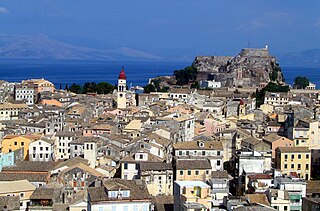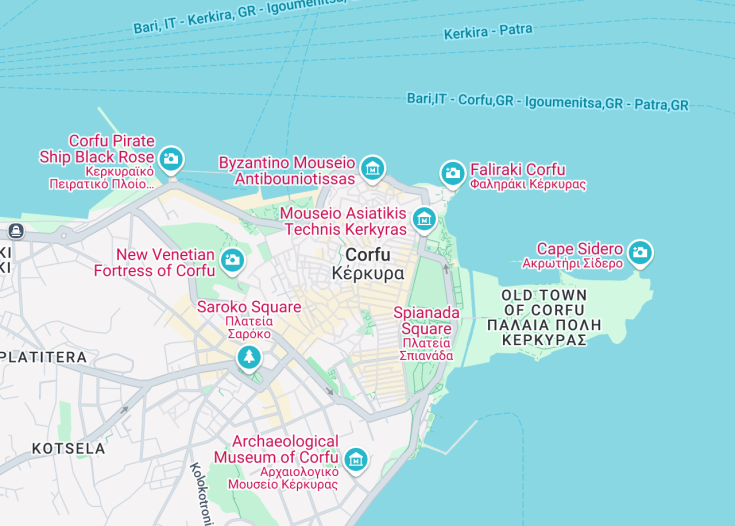Corfu, one of the most picturesque Ionian Islands in Greece, offers a blend of cultural heritage and stunning natural beauty. Known for its rugged mountains and a series of beautiful beaches, Corfu attracts visitors from around the world. Its enchanting old town, designated as a UNESCO World Heritage Site, is characterized by Venetian fortresses and meandering alleys.
The island also boasts a vibrant culinary scene, with local kumquat liqueur and fresh seafood dishes being particularly noteworthy. Whether for its historical layers or its inviting landscapes, Corfu remains an irresistible destination for both relaxed and adventurous travelers.
For an authentic experience, visit Corfu during the shoulder seasons of late spring or early autumn to enjoy fewer crowds and pleasant weather.
Explore Corfu’s coastal paths either on foot or by renting a bicycle, as they offer scenic views of the Ionian Sea and lead to secluded coves and charming villages.
Top things to do & see in Corfu
Select the following sights and activities to discover best tickets and tours available in Corfu.
Corfu: A Mediterranean Gem
| Country | Greece |
| Time in Corfu | GMT+2 |
| Language spoken | Greek |
| Population | 102,071 (source: latest census data) |
| Currency | Euro (€, EUR) |
| Airports |
|
Corfu, an island off Greece’s northwest coast in the Ionian Sea, is defined by rugged mountains and a resort-studded shoreline. Its cultural heritage reflects years spent under Venetian, French and British rule before it was united with Greece in 1864. The island is dotted with fortified castles, and its Byzantine churches, bustling markets, and charming villages are enough to enchant any visitor.
Where is Corfu?
Corfu is located in the Ionian Sea, west of mainland Greece and south of Albania.
Distances:
| Route | Distance by car | Time by car |
|---|---|---|
| Athens to Corfu | 342 mi / 550 km | Approx. 8 hours |
What is Corfu famous for?
Corfu is renowned for its stunning landscapes, historical monuments, and vibrant cultural scene, including the renowned Corfu Summer Festival that showcases operas, symphonies, and choral concerts.
History
Antiquity (Before 800 BC)
Corfu, known in ancient times as Korkyra, is steeped in mythology and history. The first inhabitants are believed to have been Illyrian tribes. According to myth, Poseidon, the god of the sea, fell in love with the beautiful nymph Korkyra, whom he kidnapped and brought to the island, consequently naming it after her. Archaeological finds suggest that the island was inhabited from earlier times, with significant developments in fortifications and pottery indicating a structured society.
Classical and Hellenistic Periods (800 BC – 146 BC)
During the classical period, Corfu was a significant naval power and a prosperous city-state. It formed an alliance with Athens during the Peloponnesian War. The cultural and economic prosperity continued into the Hellenistic period. Significant architectural contributions from this era, such as the Temple of Artemis, are emblematic of Corfu’s importance in ancient Greece.
Roman and Byzantine Era (229 BC – 1204 AD)
Corfu was integrated into the Roman Empire and later became part of the Byzantine Empire. Despite numerous invasions and attacks, notably by Goths and Vandals, it flourished as a fortified location precious to empires. Byzantine influence enriched Corfu’s religious and architectural heritage, traces of which can be observed in the surviving structures and church practices.
Venetian Rule (1386 – 1797)
The Venetian period was one of the most influential eras for Corfu. The Venetians fortified the city, leaving an indelible mark on its architecture and culture. Corfu was one of the most defended locations in Europe, its fortifications designed to thwart Ottoman invasions, which never succeeded here, unlike the rest of Greece. The legacy of Venetian rule is reflected in the local culinary, linguistic, and architectural nuances that distinguish Corfu from other Greek regions.
French, British, and Union with Greece (1797 – Present)
After a brief French rule, the British took over in 1815, bringing new administrative systems and further fortifications. They built the iconic Palace of St. Michael and St. George. In 1864, Corfu was finally ceded to Greece, marking its attachment to the modern Greek state. Today, the blend of historical influences forms the unique cultural tapestry that characterizes contemporary Corfu, an island that embraces its past while looking forward to its future.
Visit Corfu
What to see and do in Corfu, Greece.
Exploring Corfu offers a journey through picturesque landscapes, ancient ruins, and vibrant local culture. Noteworthy attractions include the Old Fortress and New Fortress, which provide insight into the island’s extensive history of fortifications.
The Achilleion Palace, originally built for Empress Elisabeth of Austria, stands as a testament to neoclassical elegance with its stunning gardens and statuary. For a touch of nature, visit the Corfu Donkey Rescue or take a hike on Corfu Trail, a pathway that extends from one end of the island to the other, offering splendid views and varied terrain.
Festivals and Events
Corfu is vibrant with events throughout the year, notably its Easter celebrations, which are the most spectacular in Greece, featuring processions, bands, and the dramatic “Pot Throwing” on Holy Saturday.
The Summer Music Festival, from July to September, boasts performances of classical and contemporary music, attracting global talents and audiences.
Best time to visit Corfu
The ideal time to visit Corfu is late spring (May to early June) when the weather is comfortably warm and the summer crowds have not yet arrived, or early autumn (September to October) when the sea remains warm and the island regains its tranquility after the busy summer season.
Is Corfu worth visiting?
Corfu is undoubtedly worth a visit. With its rich tapestry of history, diverse cultural influences, and breathtaking natural beauty, it offers a captivating experience unlike any other Greek island.
The architectural reminders of its Venetian, French, and British influences, combined with traditional Greek elements, make Corfu a unique destination that offers something for every traveler. Whether you’re a history buff, sun-seeker, or hiking enthusiast, Corfu promises an enriching and enjoyable adventure.









